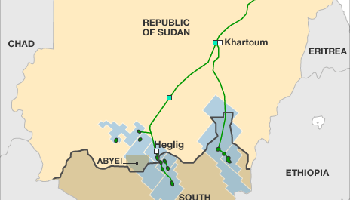Two major oil companies operating in Sudan have warned partners in South Sudan of a possible shutdown of oil production in Unity State following fresh drone attacks on a key airport in the oil-producing border town of Heglig.
In letters dated Aug. 30 and seen by Radio Tamazuj, Petrolines for Crude Oil Co. Ltd. (PETCO) and 2B Operating Co. (2B OPCO) cited a second drone strike, reportedly carried out by the paramilitary Rapid Support Forces (RSF), that hit Heglig airport in the early hours of Saturday. The incident came just four days after a similar attack on Aug. 26 that killed five people and injured seven.
The companies said escalating security threats pose a significant risk to oil infrastructure vital to both Sudan and South Sudan. Landlocked South Sudan depends on pipelines running through Sudan to export its crude oil.
PETCO addressed its warning to the Sudd Petroleum Operating Company (SPOC), while 2B OPCO sent a similar notice to the Greater Pioneer Operating Company (GPOC). Both letters were signed by General Manager Mohamed Siddiq Elhusein and said operations would continue for now, but stressed that the safety of personnel remains a top priority.
“If the attacks continue, we will be forced to initiate a potential shutdown,” the letters said.
Heglig, located along the contested border between Sudan and South Sudan, is a strategic oil hub that processes and transports oil from both countries.
A shutdown could have severe economic consequences. South Sudan would lose most of its foreign revenue, while Sudan would forfeit crucial transit fees. Both countries are already grappling with internal conflict and economic instability.
The letters were copied to senior officials in South Sudan’s Ministry of Petroleum and the Petroleum Authority.
Yahya Mohammed Osman, head of media at the Sudanese embassy in Juba, told Radio Tamazuj that the latest attack threatens not only Sudan’s economy but also regional and international interests.
“This incident underlines the urgent need for cooperation to protect national infrastructure and safeguard international investments,” Osman said.
He blamed the RSF for “barbaric behavior” in areas including Khartoum and warned of broader regional repercussions. He also voiced concern over the safety of humanitarian workers and United Nations personnel operating in Sudan.
Osman did not name foreign actors but referred to broader regional instability and past attacks on diplomatic missions and infrastructure.
“We are aware of the scale of the damage, including financial losses to aid operations in affected areas,” he said.
The Sudanese diplomat has accused the RSF of targeting civilians and critical infrastructure since fighting erupted between the RSF and the Sudanese army in April 2023. He called on the international community to support efforts to stabilize the region and secure key economic infrastructure.
RSF officials could not immediately be reached for comment.
Edmund Yakani, executive director of the Community Empowerment for Progress Organization (CEPO), a civil society organization in South Sudan, warned that continued fighting in Sudan could disrupt the pipeline system linking South Sudan’s oil fields in Unity State to global markets.
“Heglig connects South Sudan via Unity State to Sudan and transports South Sudan’s oil to international markets,” Yakani said. “Any attacks targeting these oil areas will have a negative impact.”
He urged the South Sudanese government to remain neutral and launch mediation efforts.
“I urge the government not to side with the RSF or the Sudanese army and to initiate peace,” he said.
Yakani also highlighted the economic burden of hosting Sudanese refugees, while much of South Sudan’s population relies on humanitarian aid.
He criticized the stalled regional peace process, saying a lack of political will among Sudanese parties has prevented the Intergovernmental Authority on Development (IGAD) from deploying its special envoy, Lawrence Korbandy, to mediate.
Yakani reiterated his call for neutrality and diplomacy to help end the conflict in Sudan.




